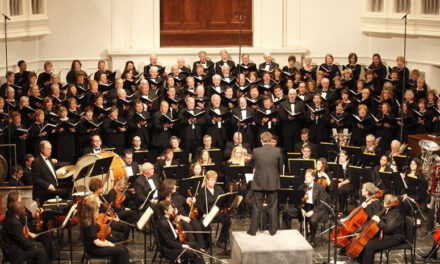Highlights for me of the Raleigh Ringers’ June 14 Meymandi Concert Hall program, directed by David M. Harris, were the suspenseful hushes during “Let All Mortal Flesh Keep Silence,” and hearing the rare sound of the huge bass bells, especially in an unpublished Hart Morris arrangement of “Dueling Banjos.” This amounted to a duel between Malmark and Whitechapel handbells. Most impressive as an original piece for handbells was “Reunir.” It was written by William A. Payn, of Rooke Chapel Ringers, Bucknell University. During this work, I noticed a flute-like sound and wondered whether it could come from bells or perchance behind the set was an organ or sound system. Dramatic suspense in a fade-away ending was exciting.
Later in the program, organ sounds seemed to be apparent. That’s a good reason that more public concert halls should have pipe organs, so all the music can be real. Yet perhaps it was real: perhaps it was bells dynamically reacting to simulate the sound. I saw no credit for backup music.
The program opened with Martha Lynn Thompson’s arrangement of the Overture to The Marriage of Figaro by Mozart. It was so familiar that I couldn’t identify it, especially because in large print, the program I held open towards the light in the darkened hall listed the first item as “Dream On.” When in the middle of the second number, my companion said, “This doesn’t sound like ‘Dueling Banjos'” (second on the list) I said, “Perhaps the first was their theme song and this is ‘Dream On.'” Font selectors, please do not place important words small print! This was one of those programs that said the audience would hear “Selections From the following list,” in small print, in the dark.
That second number turned out to be “Exultation” by Cynthia Dobrinski. It was a blush of overtones, lovely to listen to. A delightful romp called “Linus and Lucy” must have pleased the late Charles Shulz if he happened to be tuned in to the event. It was composed by Vince Guaraldi and arranged for handbells by Hart Morris.
Then came Fred Gramann’s magnificent version of “Fantasy on King’s Weston” by Ralph Vaughn Williams. The hymn tune was played at such a brisk pace that only at the end did I finally put the words to it: “At the Name of Jesus, Every Knee Shall Bow.” The tune is otherwise known as “Neumark” (by George Neumark) or as “Passion Chorale,” by Hassler. Gramann is with The American Church in Paris and will be in Raleigh for the Capital Handbell Festival later this year, at which he will teach change ringing.
“Flight of the Bumblebee” was easily recognized though unannounced; this old chestnut by Rimsky-Korsakov was arranged by Martha Lynn Thompson. It must have been most technically challenging because of the speed of the changing bells. The level of skill of the players is admirable. This skill in handling the bells was noted in “Waltz of the Flowers” from Nutcracker , as the flowing melody recreated the memorable dynamics used by the orchestra yet new to the ear because of the completely different sound of the bells.
After intermission came the “Dueling Banjos” alluded to earlier among the special impressions during the program. The use of pantomime while ringing was really fun to watch, and loud shouts from the audience followed. This duel between products of the two bell foundries was announced to have been forthcoming from Hart Morris a couple of months ago. David Harris credited one of the Raleigh Ringers’ patrons for having had the idea to commission it.
Spectacular was Julius Fucik’s “Entry of the Gladiators,” “translated” by Bill Griffin. This seemed to have swelling organ sounds in support of the arrangement. The aforementioned “Let All Mortal Flesh Adore Thee,” which followed, made a stunning contrast.
With some warning from the Director/Master of Ceremonies, the ensemble went off stage to change into something more comfortable for a couple of rock arrangements, given to assure a little something for everyone. They returned wearing tie-dye shirts of brilliant colors, and the conductor added to his costume a very longhair wig. The Ringers reached the non-classical segment of the audience with “We Will Rock You” and “We Are the Champions,” arranged by Paul McKlveen. The audience delighted in clapping and stomping for effect. Then at last came “Dream On” by Steve Tyler, arranged by Marcia Murray, and I did “dream on,” carried away by the feeling created by the ensemble.
The grand finale was arranged by Doug Smith from Igor Stravinsky’s Firebird . It was a knockout, and I did a mental flashback to the Stravinsky 75th anniversary celebration and wondered how the handbells would have sounded at St. Thomas Church in New York City. As one of God’s creatures, the Firebird could have been included along with The Rite of Spring . Perhaps it was, but certainly not with handbells!
The Director requested suggestions, focusing on people’s rock suggestions for next year’s feature; attendees may email them at rringer@rr.org . I’d like to go beyond that and suggest that if UNC-TV is still doing fillers to keep on hand to play from time to time, a collaboration of the Raleigh Ringers with Carolina Ballet in the “Waltz of the Flowers,” arranged by Toshikazu Yoshida, would publicize both not-for-profit groups. For such statewide publicity that actually impacts tourism to the capital, eager fund raising sources certainly must await a proposal for support!
How I would like to hear the Raleigh Ringers play in a large chapel. I wonder how they would resound in a stone cathedral. While the acoustics were exemplary at Meymandi, the setting seemed sterile although warmed by the standing square backdrop that belongs to the organization. Its posts blazed with spectacular torches from time to time. Colored light shone through the backdrop and matching lights colored the columns outlining it.
Hear, ye! Hear, ye! To readers who thought they would not like to hear an entire concert of handbells: this is no ringy-dingy operation. This is a world class organization. It is possible that handbell choirs will suffer the slight that professional concert organists often realize, with less than full houses until they become generally known. The reason is that there are so many ordinary organists and sitting through church music is quite enough for those who have never ventured out to a recital by a national touring artist (some live right here in North Carolina). Likewise, there are many very good but very ordinary church handbell choirs. Raleigh Ringers, by comparison, is an extraordinary organization, and everyone should invest time to hear an entire concert. Visit the group’s website at http://www.rr.org/ for more information, including sound samples.












